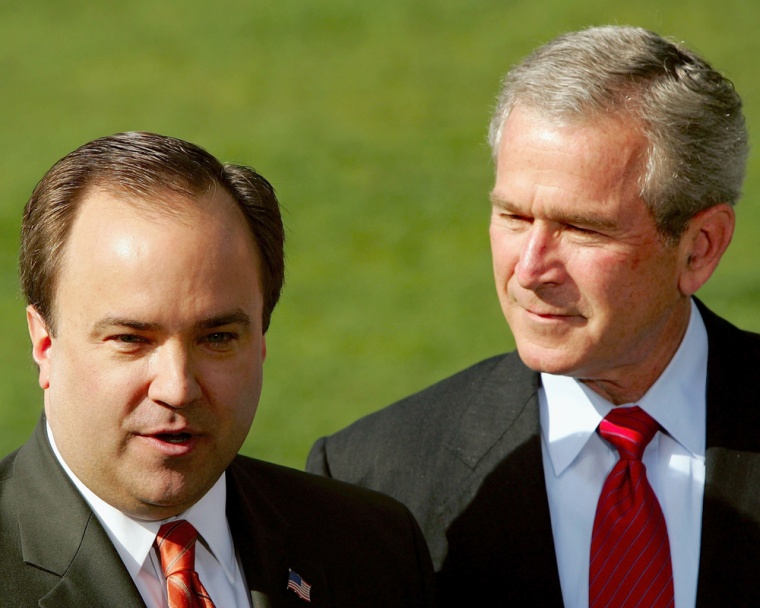Former White House spokesman Scott McClellan does not believe President Bush lied to him about the role of White House aides I. Lewis Scooter Libby or Karl Rove in the leak of CIA operative Valerie Plame's identity, according to McClellan's publisher.
Peter Osnos, the founder and editor-in-chief of Public Affairs Books, which is publishing McClellan's book in April, tells NBC from his Connecticut home that McCLellan, "Did not intend to suggest Bush lied to him."
Osnos says when McClellan went before the White House press corps in 2003 to publicly exonerate Libby and Rove, the problem was that his statement was not true. Osnos said the president told McClellan what "he thought to be the case." But, he says, McClellan believes, "the president didn't know it was not true."
Osnos says the quotes which appeared on the Public Affairs Books website were part of the roll out of the book catalogues for the spring printings. And he says McClellan had not finished the manuscript for the memoir yet and was working under deadline to have the book completed for the April publishing.
In an excerpt from his forthcoming book, released Monday on the publisher's web site, McClellan recounts the 2003 news conference in which he told reporters that aides Karl Rove and I. Lewis "Scooter" Libby were "not involved" in the leak involving operative Valerie Plame.
"There was one problem. It was not true," McClellan writes, according to a brief excerpt released Monday. "I had unknowingly passed along false information. And five of the highest-ranking officials in the administration were involved in my doing so: Rove, Libby, the vice president, the president's chief of staff and the president himself."
Bush's chief of staff at the time was Andrew Card.
The excerpt renewed questions about what went on in the West Wing and how much Bush and Cheney knew about the leak. For years, it was McClellan's job to field — and often duck — those types of questions.
Tuesday, White House press secretary Dana Perino said it wasn't clear what McClellan meant in the excerpt and she had no immediate comment.
Plame maintains the White House quietly outed her to reporters. Plame and her husband, former Ambassador Joseph Wilson, said the leak was retribution for his public criticism of the Iraq war. The accusation dogged the administration and made Plame a cause celebre among many Democrats.
McClellan's book, "What Happened," isn't due out until April, and the excerpt was merely a teaser. It doesn't get into detail about how Bush and Cheney were involved or reveal what happened behind the scenes.
In the fall of 2003, after authorities began investigating the leak, McClellan told reporters that he'd personally spoken to Rove, who was Bush's top political adviser, and Libby, who was Cheney's chief of staff.
"They're good individuals, they're important members of our White House team, and that's why I spoke with them, so that I could come back to you and say that they were not involved," McClellan said at the time.
Both men, however, were involved. Rove was one of the original sources for the newspaper column that identified Plame. Libby also spoke to reporters about the CIA officer and was convicted of lying about those discussions. He is the only person to be charged in the case.
Since that news conference, however, the official White House stance has shifted and it has been difficult to get a clear picture of what happened behind closed doors around the time of the leak.
McClellan's flat denials gave way to a steady drumbeat of "no comment." And Bush's original pledge to fire anyone involved in the leak became a promise to fire anyone who "committed a crime."
Bush most recently addressed the issue in July after commuting Libby's 30-month prison term. He acknowledged that some in the White House were involved in the leak. Then, after repeatedly declining to discuss the ongoing investigation, he said the case was closed and it was time to move on.
NBC producer Joel Seidman contributed to this story.
